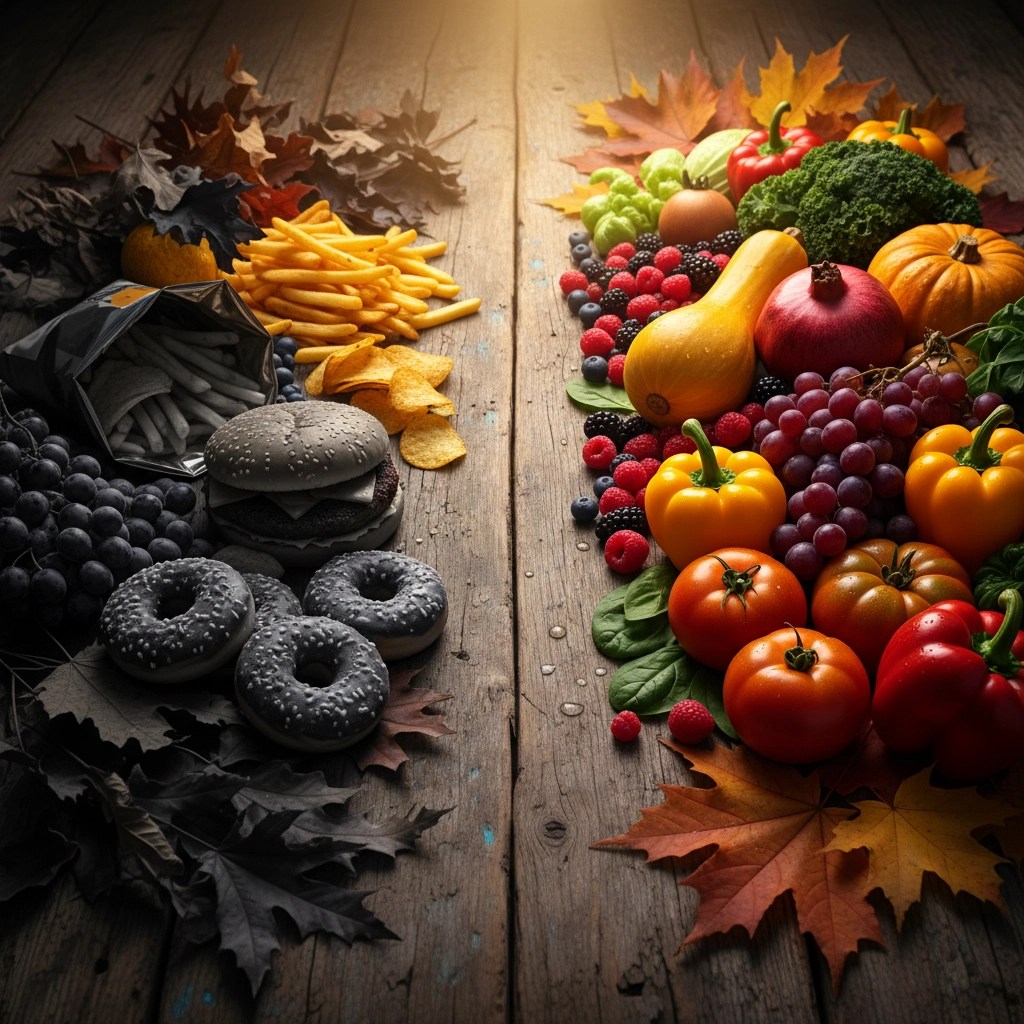Ever notice how a warm bowl of soup on a chilly day makes everything feel better? Or how that afternoon chocolate treat can turn your whole mood around? There's actual science behind these feel-good moments – and it's way more fascinating than you might think.
Your brain runs on fuel just like your car, and the quality of that fuel directly impacts how you feel, think, and experience life. The good news? You have three opportunities every day (plus snacks!) to boost your mood, increase your energy, and create a foundation for lasting happiness.
The Real Science Behind Food and Feelings
Here's what's actually happening in your body: when you eat, nutrients from your food influence neurotransmitter production, brain inflammation levels, and blood sugar stability. These aren't just fancy science words – they're the building blocks of how happy, calm, and energized you feel throughout the day.
Research shows that diets rich in fruits, vegetables, whole grains, and healthy fats actively support mental health, while processed foods can leave you feeling sluggish and emotionally drained. In one incredible study, people following a Mediterranean-style diet saw a 20.6-point reduction in depression symptoms over 12 months. That's the power of food as medicine!
But here's the really cool part: it works both ways. When you're stressed or down, you might crave comfort foods, but those same foods can make it harder to handle stress, creating a cycle. The amazing thing is, you can flip that cycle in your favor.

Your Mood-Boosting Food Arsenal
The Chocolate Connection
Let's start with everyone's favorite – chocolate! Dark chocolate contains natural compounds called anandamides that target the same brain receptors affected by cannabis (no, really!). It also has tyramine and phenyl ethylamine, which work similarly to mood-lifting chemicals. The key is moderation: regular small amounts boost happiness, but too much can actually increase anxiety.
Fruits: Nature's Antidepressants
People who eat fruit regularly experience fewer depressive symptoms and greater psychological well-being. Berries are especially powerful because they're packed with antioxidants that fight brain inflammation. Fall favorites like apples and pears provide steady energy and natural sweetness that keeps your mood stable.
The Omega-3 Factor
Found in fatty fish, walnuts, and flaxseeds, omega-3s are like premium fuel for your brain. Low levels have been linked to depression and mood swings, while adequate intake supports emotional balance and mental clarity.
Gut-Happy Foods
Your gut produces about 90% of your body's serotonin (the happiness chemical), so keeping it healthy is crucial. Yogurt, kefir, sauerkraut, and other fermented foods feed the good bacteria that support both digestion and mood.
Autumn Comfort: Seasonal Foods That Warm Your Soul
Fall is the perfect time to embrace foods that naturally comfort and nourish. These seasonal favorites aren't just delicious – they're scientifically proven mood boosters:

Warm Spices for Happy Vibes
Cinnamon helps stabilize blood sugar (goodbye mood swings!), while nutmeg contains compounds that may reduce stress. Ginger fights inflammation and aids digestion. Try adding these to your morning coffee, oatmeal, or evening tea.
Cozy Fall Snack Ideas:
- Apple slices with almond butter and a sprinkle of cinnamon
- Homemade trail mix with walnuts, pumpkin seeds, and dark chocolate chips
- Warm golden milk with turmeric and honey
- Roasted butternut squash soup (the beta-carotene boosts brain health!)
- Sweet potato fries baked with herbs
The Power of Warm Foods
There's something deeply satisfying about warm foods when the weather turns cool. Soups, stews, and herbal teas aren't just comforting – they help your body maintain energy without the crashes that come from cold, sugary snacks.
Mindful Eating: The Game-Changer
Here's where the magic really happens. Mindful eating isn't about restriction – it's about tuning into what makes you feel amazing. When you eat mindfully, you naturally gravitate toward foods that fuel your best mood and energy.

Simple Mindful Eating Practices:
The 5-Minute Morning Check-In: Before your first meal, ask yourself: "What does my body need to feel energized today?" Sometimes it's protein for sustained energy, sometimes it's something warm and comforting.
The Midday Reset: Notice how different foods affect your afternoon energy. Do you feel more alert after a salad with protein, or does a heavy lunch leave you sluggish?
Evening Reflection: Pay attention to how dinner impacts your sleep and morning mood. Lighter, earlier dinners often lead to better rest and happier mornings.
Building Your Daily Mood-Food Routine
Morning: Set the Foundation
Start with protein and healthy fats to stabilize blood sugar for the day. Think eggs with avocado, Greek yogurt with nuts and berries, or oatmeal with nut butter. Your brain will thank you with steady energy and clear thinking.
Midday: Maintain the Balance
Combine complex carbs with protein and veggies. This keeps your blood sugar stable and prevents the 3 PM crash. Quinoa bowls, hearty salads, or vegetable-packed soups are perfect choices.
Evening: Wind Down Naturally
Lighter meals with tryptophan-rich foods (like turkey, pumpkin seeds, or chamomile tea) can help you relax and prepare for restorative sleep.

The Blood Sugar Connection Nobody Talks About
One of the biggest mood killers? Blood sugar roller coasters. When you eat high-sugar or processed foods, your blood sugar spikes, then crashes, triggering stress hormones that leave you anxious, irritated, and craving more sugar.
Stable Blood Sugar = Stable Mood:
- Pair carbs with protein or healthy fats
- Choose whole grains over processed ones
- Eat regular meals and snacks
- Stay hydrated (dehydration affects mood too!)
Quick Fixes for Common Mood Dips
Feeling Sluggish? Try a green smoothie with spinach, banana, and almond milk. The natural sugars provide quick energy while the greens offer sustained nutrition.
Afternoon Anxiety? Magnesium-rich foods like dark chocolate (yes!), pumpkin seeds, or a cup of herbal tea can help calm your nervous system.
Evening Blues? Complex carbs like sweet potatoes or oatmeal can boost serotonin production naturally.

Making It Sustainable (Because Life is Busy!)
The best mood-boosting diet is one you can actually stick with. Here are some realistic strategies:
Batch Prep Mood Foods: Wash and chop fruits and veggies on Sunday. Cook a big pot of soup or stew you can reheat all week.
Smart Substitutions: Swap refined snacks for nuts, seeds, or fruit. Choose herbal tea over sugary drinks. Pick dark chocolate over milk chocolate.
The 80/20 Rule: Aim for nourishing foods 80% of the time, and don't stress about the other 20%. Perfectionism kills joy, and joy is the whole point!
Your Food = Your Mood Superpower
The connection between what you eat and how you feel isn't just real – it's incredibly powerful. Every meal and snack is an opportunity to support your mental health, boost your energy, and create the foundation for a happier day.
This fall, embrace the seasonal comfort foods that truly nourish you. Practice mindful eating that honors what your body needs. And remember: small, consistent changes create the biggest transformations.
Your mood isn't at the mercy of random circumstances – it's influenced by choices you make three times a day. Use that power wisely, and watch how good you can feel when you eat good, feel good, and choose happiness, one delicious bite at a time.